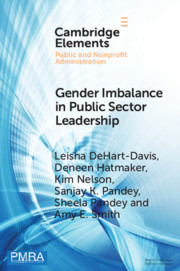Faculty Members Explore Gender Imbalance in Public Sector Leadership in Latest Publication
Faculty members Leisha DeHart-Davis and Kimberly Nelson recently co-authored a book entitled Gender Imbalance in Public Sector Leadership: The Glass Cliff in Public Service Careers, for the Cambridge University Press Elements in Public and Nonprofit Administration series. Having studied the issue of gender imbalance in the administration field since 2014, the two are leading the discussion on gender imbalance in the field and the significant community impact addressing this imbalance could have.
Women are underrepresented as public-sector organizational leaders, despite comprising half of the U.S. public-sector workforce. This book explores the factors driving gender imbalance in local government management. The authors conducted interviews and data analysis, which suggests that women in local government management face a complex puzzle of gendered experiences, career paths, and appointment circumstances.
Nelson and DeHart-Davis have been studying this issue since 2014. “Right around the time that Sheryl Sandburg published Lean In," said DeHart-Davis. "That book made us think through the barriers and opportunities for women serving in local government leadership."
Addressing gender imbalance in the public sector can have significant community impact. "We know that when leaders and employees of public organizations look like the communities they serve, citizens perceive government as more legitimate and tend to be more cooperative," said DeHart-Davis. "Existing research also tells us that women tend to have slightly different leadership styles that benefit communities: more inclusive and less hierarchical."
Nelson explained that many local governments are facing a gap at the management level between retiring managers and newly trained managers entering the field. "The COVID pandemic has demonstrated how critical skilled management is to helping local governments be resilient in times of rapid change," said Nelson. "In order to ensure that all local governments are professionally managed, the proportion of female managers has to increase.”
Other co-authors include Deneen Hatmaker (University of Connecticut), Sanjay K. Pandey (George Washington University), Sheela Pandey (Penn State Harrisburg) and Amy Smith (University of Massachusetts, Boston). DeHart-Davis assembled the group after learning that each person had an interest studying diversity in the public sector, but that they were all approaching that work in different ways.
Nelson says her work on gender imbalance comes up in her teaching, both with local government officials as well as Master of Public Administration students. "I believe one of my responsibilities is to promote the profession, particularly to women and minorities. This type of work helps me talk to students about the challenges the profession is facing in equity and inclusion," said Nelson. "Since I primarily work with city and county managers as my client group, I believe this type of research helps me promote and design training on diversity and inclusion, which are key goals for both the state and national association of city and county managers."
DeHart-Davis is also exploring how the language of recruitment, or the words used in job ads, may affect whether women apply to local government management positions.
Published July 16, 2020



